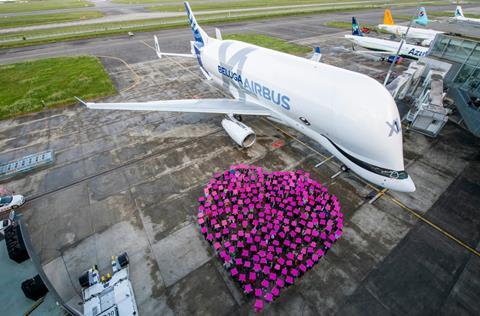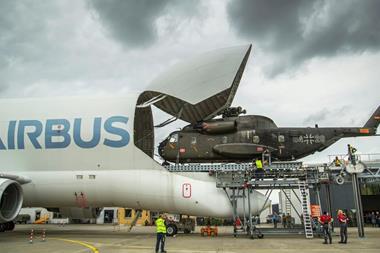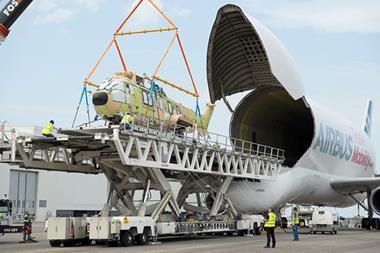
The last of six Airbus BelugaXLs has now entered service with Airbus Transport International (ATI) after serving as the programme’s test aircraft since 2018.
Through operations with Airbus subsidiary ATI, which has been Airbus' internal airline since 1996, these aircraft carry sub-assemblies and components between Airbus’ European manufacturing sites.
Based on the A330-200 freighter, each BelugaXL has a payload capacity of 51 tonnes and a range of 2,200 nautical miles. The aircraft offer 30% more payload capacity than its predecessor the A300-600ST BelugaST.
BelugaXL can accommodate the largest A350 fuselage section or two of the widebody’s 30-metre long wings – whereas its predecessor could only carry one.
This last BelugaXL to enter service served as a test aircraft for the programme until last year. In four years, the giant airlifter completed over 800 flight test hours during which pilots explored how the BXL handled the kind of operating conditions it would encounter when travelling between 11 European destinations.
The final handover to ATI marks the closure of the BelugaXL programme, launched in 2014. The centralised development team brought together around 1,000 Airbus engineers and suppliers in Toulouse, France to build the aircraft.
The team worked to shorten decision loops and simplify processes. Parts, equipment and design principles were re-used and borrowed from other Airbus platforms wherever possible.
“We created the BelugaXL, but also what we called the BXL spirit – making the impossible possible," said Bertrand George, who led the plane’s development.
Although each of the six aircraft was certified and delivered on time, getting the BXL programme off the ground came with plenty of challenges.
“Our instructions were to halve the BXL’s original development cost, and deliver the first aircraft – certified as a normal A330ceo – within five years,” added Bertrand. “Fortunately we had carte blanche to explore novel approaches to make it happen. Those experiences will be beneficial to future programmes in all of Airbus’ businesses.”
Each BelugaXL mission averages a turnaround time of just 70 minutes, due to specially designed loading facilities at plants in France, Germany, Spain and the UK.
ATI hopes to operate the BelugaXL for thirty years. The fleet is forecast to reach 9,500 flight hours annually by 2027, compared to a planned 6,500 flight hours in 2024.
The five-strong BelugaST fleet is now being operated by Airbus Beluga Transport (AiBT).
https://www.aircargonews.net/airlines/airbus-beluga-transport-certified-for-operations/















